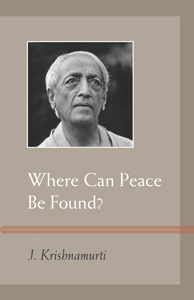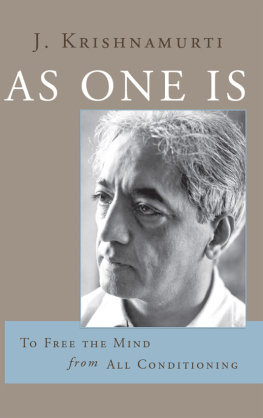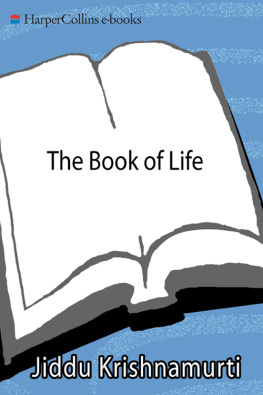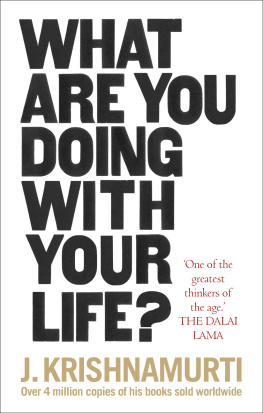Krishnamurti - What Are You Doing With Your Life?
Here you can read online Krishnamurti - What Are You Doing With Your Life? full text of the book (entire story) in english for free. Download pdf and epub, get meaning, cover and reviews about this ebook. publisher: Ebury Publishing, genre: Religion. Description of the work, (preface) as well as reviews are available. Best literature library LitArk.com created for fans of good reading and offers a wide selection of genres:
Romance novel
Science fiction
Adventure
Detective
Science
History
Home and family
Prose
Art
Politics
Computer
Non-fiction
Religion
Business
Children
Humor
Choose a favorite category and find really read worthwhile books. Enjoy immersion in the world of imagination, feel the emotions of the characters or learn something new for yourself, make an fascinating discovery.
- Book:What Are You Doing With Your Life?
- Author:
- Publisher:Ebury Publishing
- Genre:
- Rating:5 / 5
- Favourites:Add to favourites
- Your mark:
- 100
- 1
- 2
- 3
- 4
- 5
What Are You Doing With Your Life?: summary, description and annotation
We offer to read an annotation, description, summary or preface (depends on what the author of the book "What Are You Doing With Your Life?" wrote himself). If you haven't found the necessary information about the book — write in the comments, we will try to find it.
What Are You Doing With Your Life? — read online for free the complete book (whole text) full work
Below is the text of the book, divided by pages. System saving the place of the last page read, allows you to conveniently read the book "What Are You Doing With Your Life?" online for free, without having to search again every time where you left off. Put a bookmark, and you can go to the page where you finished reading at any time.
Font size:
Interval:
Bookmark:

WHO ARE YOU? WHAT ARE YOU? WHAT DO YOU WANT FROM LIFE?
One of the worlds great philosophical teachers, Krishnamurti, offers his inspiring wisdom on many of lifes hurdles from relationships and love, to anxiety and loneliness.
He answers such questions as What is the significance of life? and How do I live life to the full? to reveal the best way of being true to yourself.
Read by millions from all walks of life, Krishnamurti shows us there is no path, no higher authority, no guru to follow, and that ultimately it is our own responsibility as to how we live our lives.
Krishnamurti was born in 1895 in India. He is regarded globally as one of the greatest thinkers and religious teachers in recent times. He explained with great precision the subtle workings of the human mind, and pointed to the need for bringing to our daily life a deeply meditative and spiritual quality. He did not expound any philosophy or religion, but rather talked of the things that concern all of us in our everyday lives, of the problems of living in modern society. He died in 1986.
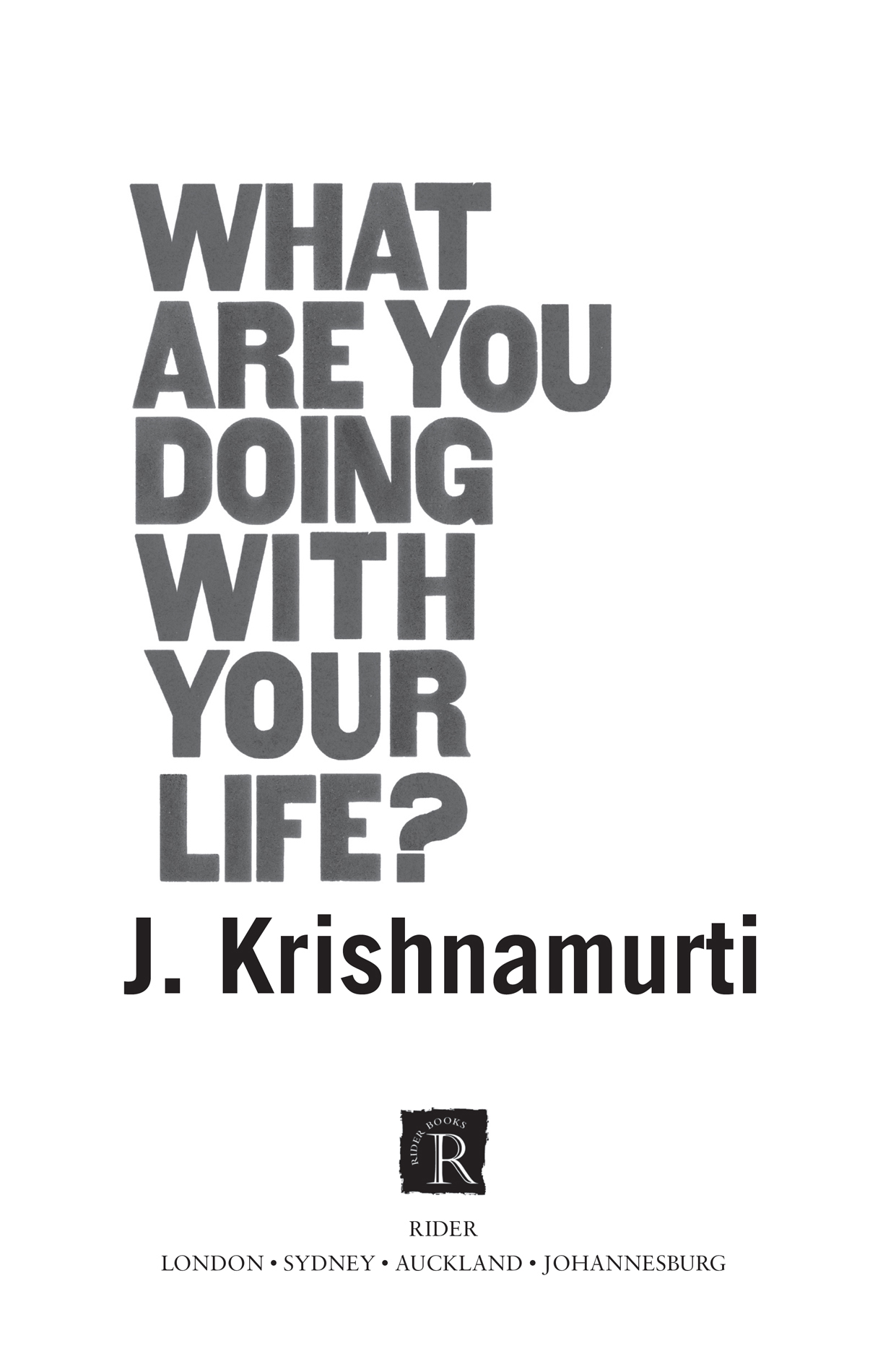
One of the greatest thinkers of the age
The Dalai Lama
One of the five saints of the 20th century
Time magazine
In my own life Krishnamurti influenced me profoundly and helped me personally break through the confines of my own self-imposed restrictions to my freedom.
Deepak Chopra, M.D.
I feel the meaning of Krishnamurti for our time is that one has to think for oneself and not be swayed by any outside religions or spiritual authorities.
Van Morrison, Musician
To listen to him or to read his thoughts is to face oneself and the world with an astonishing morning freshness.
Anne Morrow Lindbergh, Poet, Author
It was like listening to a discourse of the Buddhasuch power, such intrinsic authority.
Aldous Huxley
J. Krishnamurti taught young people all over the world and founded schools in California, England, and India. When one is young, he said, one must be revolutionary, not merely in revoltto be psychologically revolutionary means non-acceptance of any pattern.
THE WAY YOU and I relate to our own brains, to each other, to our own possessions, to money, to work, to sexthese immediate relationships create society. Our relationship to ourselves and one another multiplied by six billion creates the world. The collection of each of our prejudices, all our separate lonelinesses put together, each greedy ambition, each physical or emotional hunger, every anger and sadness in every one of uswe are the world.
The world is not different from usthe world is us. So it is simple: if we change, each one of us, we change the world. If even one of us changes, it has a ripple effect. Goodness is contagious.
In school, we are educated to listen to our parents and teachers. Technologically, this makes sense. But thousands of generations have still not learned psychologically how to stop suffering and stop inflicting suffering on others. Psychological evolution has not accompanied biological or scientific evolution. We can all learn how to make a living: the art of living, however, we must each learn on our own.
Life hurts us all, from loneliness, confusion, the feelings of failure, despair. Life hurts from being poor, emotionally ill, from violence in the streets or at home. We are taught many things, but rarely how to deal with the shock of lifes hurts. For one thing, we are not taught that it is not life, but our own reactions to what happens to us that is the cause of pain. It is our fear, rooted in self-protection that causes the pain. To protect the body is natural: but is it natural to protect what we call our self? What is this self that is the root of the trouble, the psychological pain we feel when we try to protect it? If you merely escape mental pain and confusion with drugs, entertainment, sex, busy-ness, the painful problem is still there, compounded with exhaustion and addiction. Attention to the ways of the self, understanding that fear, desire, and anger are natural but that you dont have to act them out or have everything you wantthis insight dissolves mental anguish without adding to it. We need to learn to understand the self to understand that it is the source of our problems. Not to be self-absorbed, but to pay attention to the thoughts, feelings, activities of the self, its biological and personal, gender and cultural conditioning: this is meditation. These talks and writings are by a man who lived in the same way as societys great outsiders: the rebel; the wandering poet; the religious philosopher; iconoclastic sage; the breakthrough scientists and psychologists; the great traveling teachers of all millennia. For sixty-five years, Krishnamurti spoke of psychological freedom to whoever would listen to his message. He founded schools for children, teens, young adults, where young people can study all the usual subjectsand themselves as well. In the schools, as in all the talks and writings, he pointed out that it is not our wars, inner and outer, that will set us free, but the truth about ourselves. There is no path, no authority, no guru to follow: you have the capacity in yourself to find out what you are, what you are doing with your life, your relationships, and with your work. You must experiment with what is said in this book. Someone elses truth sounds like only opinion until you try it out for yourself. You must look through the microscope yourself, or you will be left with the dust of words, not the actual perception of life.
We are usually taught what to think, but not how to think. We learn how to escape loneliness and mental suffering, not how to put an end to it.
All of the selections in this volume are taken from Krishnamurtis books, his reported and recorded dialogues, and public talks. Try the experiment of reading this book, and further sources listed in the back, and see for yourself what happens.
A LAST NOTE : K, as this teacher called himself, often apologized to women for using the words he, him, his, man, in the talks and writings. He included all human beings in his teachings.
Dale Carlson
Editor
JIDDU KRISHNAMURTI (1895-1986) was born of Indian parents, educated in England, and gave talks around the world. He claimed allegiance to no caste, nationality, or religion and was bound by no tradition.
His teachings of more than 20,000,000 words are published in more than 75 books, 700 audiocassettes, and 1200 videocassettes. Thus far, over 4,000,000 copies of books have been sold in twenty-two languages. Together with the Dalai Lama and Mother Teresa, Krishnamurti was declared by Time magazine to be one of the five saints of the 20th century.
He traveled the world for sixty-five years speaking spontaneously to large audiences until the end of his life at age ninety. The rejection of all spiritual and psychological authority, including his own, is a fundamental theme. He said man has to free himself of fear, conditioning, authority, and dogma through self-knowledge. He suggested this will bring about order and real psychological change. The conflict-ridden violent world cannot be transformed into a life of goodness, love, and compassion by any political, social, or economic strategies. It can be transformed only through mutation in individuals brought about through their own observation without any guru or organized religion.
Font size:
Interval:
Bookmark:
Similar books «What Are You Doing With Your Life?»
Look at similar books to What Are You Doing With Your Life?. We have selected literature similar in name and meaning in the hope of providing readers with more options to find new, interesting, not yet read works.
Discussion, reviews of the book What Are You Doing With Your Life? and just readers' own opinions. Leave your comments, write what you think about the work, its meaning or the main characters. Specify what exactly you liked and what you didn't like, and why you think so.





